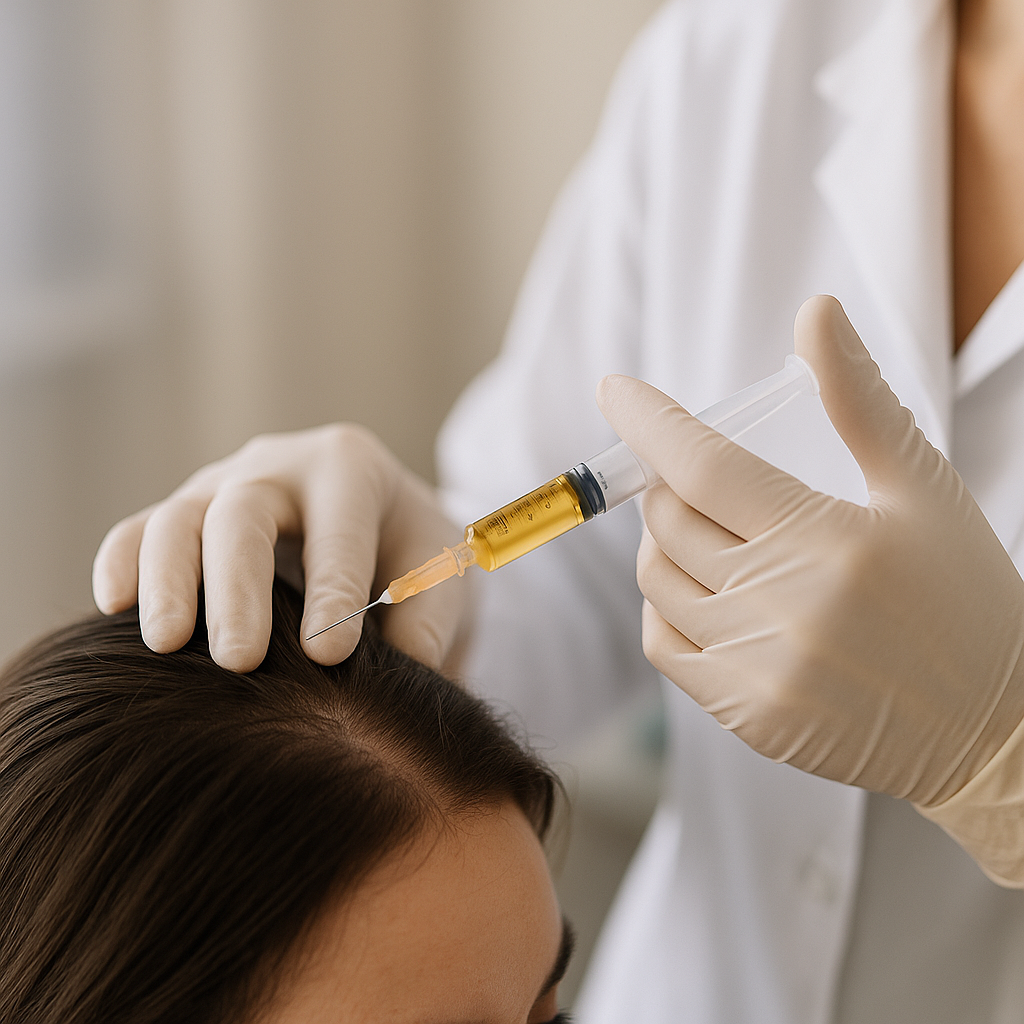Disclaimer: This content is for educational purposes only. The statements here have not been evaluated by the U.S. Food & Drug Administration and are not intended to diagnose, treat, cure, or prevent any disease. Individual results may vary. Always consult a qualified, licensed healthcare provider before pursuing any new treatment.
What Is PRP Therapy?
Platelet-rich plasma (PRP) therapy uses a small sample of your own blood—spun in a centrifuge to concentrate growth factors—which is then injected into areas of thinning or shedding on the scalp. In Metro-Detroit and throughout Michigan, this investigational approach may help stimulate hair follicles in early-stage hair loss.
How PRP Therapy Works (In Simple Terms)
-
Blood Draw: A vial of blood is collected, typically from the arm.
-
Centrifugation: The sample is spun to separate platelet-rich plasma from red blood cells.
-
Scalp Injections: The PRP “serum” is injected into targeted scalp areas using fine needles.
This minimally invasive procedure usually takes under an hour, requires no general anesthesia, and involves minimal downtime—most patients resume normal activities within 24 hours.
Potential Benefits & Research Insights
-
Follicle Stimulation: Early-stage studies suggest PRP may encourage dormant follicles to enter a growth phase.
-
Hair Density Improvement: Some users report modest increases in hair density after multiple sessions.
-
Reduced Shedding: Preliminary data indicate possible reductions in hair shedding rates.
Note: These outcomes are based on small clinical trials and patient reports; larger, controlled studies are still needed.
Candidate Considerations
PRP therapy may be considered for individuals who:
-
Notice early-stage hair thinning or pattern loss
-
Have healthy platelet counts and no active scalp infections
-
Seek a non-surgical option with minimal downtime
PRP is generally not advised for those with:
-
Advanced baldness with little follicular activity
-
Certain blood disorders or autoimmune conditions
-
Active scalp dermatologic issues (e.g., open sores)
A thorough medical consultation in Detroit or elsewhere in Michigan is essential to determine suitability.
Safety & Important Considerations
-
Injection-Site Reactions: Mild soreness, redness, or bruising can occur.
-
Infection Risk: Strict aseptic technique is critical to prevent local infections.
-
Variable Results: Individual responses differ—some see improvement, others less so.
-
Uninsured & Elective: PRP is typically elective and not covered by insurance; discuss costs upfront.
Always disclose your full health history—including clotting disorders and medications—to your provider during the initial consultation.
Working with a Qualified Provider in Detroit & Michigan
-
Verify Credentials: Seek a board-certified dermatologist, hair-restoration specialist, or functional-medicine physician experienced in PRP protocols.
-
Evidence-Informed Protocols: Ensure your clinic follows sterile, published methods and uses FDA-registered or USP-compliant preparation kits.
-
Personalized Treatment Plan: A thorough scalp and health evaluation should guide session frequency (often every 4–6 weeks for 3–4 treatments) and any complementary therapies.
Finding PRP Therapy Near You
Residents of Detroit, Royal Oak, Ann Arbor, and surrounding Metro-Detroit communities can explore PRP hair-support plans at 4Ever Health. Our team emphasizes transparency, realistic expectations, and ongoing monitoring to help you decide if PRP may align with your hair-health goals.
📞 Call us at (313) 290-2250
🌐 Visit 4everhealth.org to schedule a consultation


